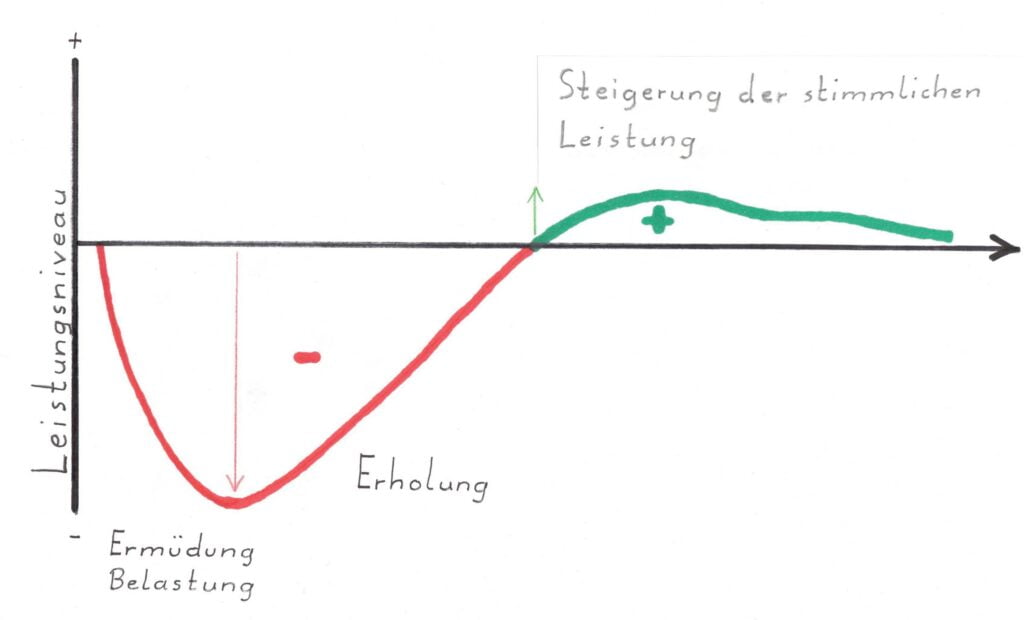Practicing is the be-all and end-all of becoming good. For many singing beginners, however, practicing also raises completely new, practical questions: How will my neighbor react if I sing loudly in my apartment - or don't sing, but instead sing up and down in the same tone levels over and over again? What is the best way to regulate this in order to protect myself? How often should I actually practice? And should I always do the same exercises, or different ones each time?
These are questions that my voice students ask me again and again. In this blog article I would like to give you helpful answers and tips to these questions. For the sake of clarity, I've chosen a question-and-answer scheme along the lines of "Frequently Asked Questions". Let's start with one of the biggest obstacles for singing beginners:
"What do I do if I don't dare sing at home because of my roommates, family, or neighbors?"
It's always liberating to be completely open and upfront about the need to practice. My tip: Talk to your roommates or neighbors beforehand. Find out what your neighbors' activity rhythms are and what they need to rest. Maybe your neighbor works shifts, or your roommate has to study at certain times. Then you can arrange fixed exercise times. In most cases, it is possible to find mutually agreeable solutions in a personal conversation in advance.
If you are a vocal student or already a vocal professional, you can try to minimize the noise level. Noise protection measures such as sound insulation panels can help a lot and can be improvised with simple means. Or you can sing in a soundproof practice booth.
"When and for how long can I practice in my home?"
The legal regulations on the subject of domestic music-making and disturbance of the peace may vary in different cities, so it is advisable to orient yourself to local regulations and guidelines. Singing in the home is usually allowed during the day, as most people are working or otherwise occupied at that time. Singing above room volume is not permitted during lunchtime (1 to 3 p.m.), during nighttime quiet hours (10 p.m. to 6 a.m. or 7 a.m.), and on Sundays and holidays.
Making music is part of the exercise of the general right of personality and is protected by the constitution. However, there are different court rulings on how long you may practice daily. Therefore, I cannot make a general statement about how long you may sing at home every day. As a rule, however, up to two hours of singing per day should be allowed. This sounds like little, but it is more than enough for your singing practice, as you will see below.
"What if it doesn't work at home?"
Sometimes it just doesn't work to practice singing within your own four walls. Then it's a case of being creative and going out of your way to find other places to sing. Here are my tips for alternatives:
- Rental rehearsal room: In many cities there are music schools, studios or rehearsal rooms that you can rent by the hour to practise in peace.
- Community centres: Often there are free or low-cost opportunities to sing and practise with others in community centres or church halls.
- Sing outside: If the weather is good (and not too cold), you can go to a quiet park or secluded area and sing there. Make sure you don't disturb anyone (people or animals).
- Karaoke bars and open stages: Visit an open stage or karaoke bar and take advantage of the opportunity to sing in front of an audience, find the best option for you and have fun singing!
"How can I integrate singing practice into my daily life?"
Some of my students like to practice at home while cooking, doing the dishes, cleaning or tidying up. Others love to practice and sing in the car, or even on their bikes. It can be difficult to fit practice times for singing into your daily routine, especially if you have a busy schedule. Here are some tips that can help you find time to practice regularly:
- Set realistic goals: Start with small goals that you can achieve without much effort, and then slowly work your way up. For example, you could aim to sing for 10 minutes every other day, and then gradually increase the time you spend on vocal exercises to 30 minutes.
- Create a fixed schedule: Choose a fixed time every other day to practise regularly and write down your schedule. Depending on your daily routine, the best time for your singing practice can be in the afternoon, towards evening or in the morning.
- Use online reminders for your exercise routine: Set up an online calendar or a timer on your smartphone to remind you of your daily exercise time.
- Use breaks in your daily routine to sing: For example, if you are taking a break from your work or waiting for the bus, you could use this time to do some simple but effective singing exercises.
- Make it a habit: The more often you practise, the more likely it is that vocal exercises will become a regular habit. Think of your practice time as an important part of your day that you should always have time for.
Don't give excuses that people like to use to get out of practicing. If you "don't have time," make time. Be consistent about building practice time for singing into your daily routine. If you follow these tips, you will soon make more and more progress in your singing.
"What should I keep in mind when practicing at home?"
Every practice session needs a suitable setting. There are a few things to consider regarding the place, the practice time, but also the structure and the tools of your vocal exercises. Here are some tips from me:
- Warm-up: Always start with a short warm-up exercise to loosen up your voice. For example, you can sing or hum a few scales in a medium position to prepare your voice for singing.
- Breathing: Pay attention to your breathing when you sing. Breathe over the deep abdominal breathing and support your tones to stabilize and preserve your voice.
- Posture: Stand or sit upright and keep your head straight (in the picture: like on a marionette string). Good posture supports your breathing and counteracts muscular tension when singing.
- Concentration: Practice in a quiet environment so that you can concentrate well on your exercises. Create an environment with as few distractions and disturbances as possible.
- Slowness and patience: With each new exercise, start slowly and build up your speed gradually to ensure you are using the technique correctly.
- Moderate effort: Practice for shorter periods rather than too long and carefully approach your vocal limits. Watch for signs of fatigue or overexertion and take a break if necessary.
- Audio recordings: Make a recording of your voice as you practice so you can work independently to improve your technique and hear your progress.
- Fun: The most important thing is to have fun while singing at home and not to put too much pressure on yourself. Realise that mistakes are there to learn from and get better. Enjoy the process of improving your skills.
"How long and how often should I practice?"
The time and frequency of your practice sessions depend on several factors. Among other things, how experienced you are (amateur singer or professional?), what your goals are (performing as a singer-songwriter or being booked for a musical?) and, of course, how much time you have. In any case, however, it is recommended to give preference to regular, short practice sessions over irregular, excessive sessions that last for hours.
Out of sheer enthusiasm, many practice too long at once in the beginning. They then risk damaging their voice through the unaccustomed, high strain. If you experience unpleasant sensations during vocal exercises, a scratchy throat or other discomfort, then take a break, rethink the exercises and shorten your practice time. Especially if you have a cold or are still recovering from a respiratory infection.
A properly timed balance between practice and recovery is the key to healthy and sustainable voice development. Because only after practicing, in the recovery phase, your voice muscles build up.

A good rule of thumb for beginners is to practice every other day for about 15-30 minutes. After a period of acclimatization, you can then extend the practice to 15-30 minutes daily. If you don't have much time to practice at a stretch, it makes sense to divide your practice time into smaller units, such as 10- or 15-minute blocks during the day.
Advanced singers can gradually increase their practice time to one to two hours maximum per day. However, they do not follow the same practice routine every day, but set different priorities depending on what they are preparing to sing.
"How do I set up my practice session, and what exercises do I do?"
As a beginner in singing, it is common to repeat the same exercises over and over again at first. Exercises for breathing and support, vowel and consonant exercises, exercises for connecting the chest and head voice or for expanding the vocal range: The basic exercises can be repeated over and over again and unchanged in the initial phase. This creates and secures the neuromuscular pathways that are so important for singing high and low.
After the first few months of building up, the practice routine should then be expanded and varied. Many advanced or professionals structure their practice routine by training different vocal requirements every day. An instructive comparison here is with the so-called "Split Training" in weight training.
Just as an advanced strength athlete does not train the whole body every time, but divides his training over the week according to muscle groups, experienced singers also "split" their training. After their daily warm-up and a few repetitive exercises, they set different priorities: On different days of the week, for example, they focus on:
- Consonant exercises + song work,
- Head voice and register transitions + song work,
- Rhythm exercises + song work,
- vocal endurance + songs (longer practice session),
- Belting exercises + work on high song passages (short and intensive),
- Breath and support + song work,
and then take a day's break from tuning.
The most diverse combinations of exercises can be done here in a weekly rhythm. They make voice training varied even for singers who have been active for many years. The main advantage of splitting up the voice exercises is that each function of the complicated muscle, cartilage and tendon apparatus of the voice has enough time to recover - despite hours of training every day.
Do you for example Belting exercisesthen your vocal muscle needs a few days to recover and become stronger for your singing with a full voice in high registers. In the days in between, you can still train your tone support or tongue muscles with consonant exercises. Or Head voice exercises for your laryngeal tilt muscles. This way you will achieve a good build-up curve for each muscular component of your vocal organ (as shown in the graphic above).
The last phase of your training session should be dedicated to your song work. And at the end of the session, a vocal cool down will help you relax your vocal muscles again and come to rest.
Conclusion
Every voice is different, even the best time of day to practice can be different for everyone. Find practice times that suit your energy level throughout the day and make the necessary arrangements with those around you. Increase your practice time over time to improve your vocal skills step by step.
Keep in mind that the quality of your practice is more important than the quantity. Instead of focusing on the sheer number of hours, set small, well-defined goals and concentrate entirely on improving your technique. A varied practice routine with recurring vocal exercises and sufficient break times is the best guarantee for steady progress. And for the fun of singing.
If you are on the road a lot, then online singing courses can be a great tool for your practice. My online courses offer you effective exercises for your singing routine, your advantage: once booked, you can access them when and where you want.






